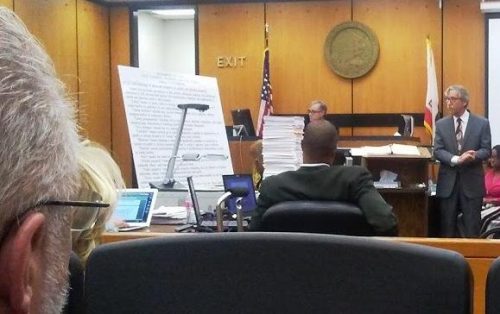 By Cres Vellucci
By Cres Vellucci
Despite what appeared to be overwhelming evidence that the homeless are treated differently than the general public by the City of Sacramento, the jury in a nearly two-week civil trial determined late Thursday, by a vote of 9-3 after only 5 hours of deliberation, that the City does not discriminate against the homeless when enforcing the no camping ordinance.
The loss, rendered in Sacramento Superior Court, wasn’t the end of the road for Plaintiffs’ attorney, Mark Merin. He confided that his firm would, within the next 30 days, file a more wide-ranging suit in federal court attacking the constitutionality of the entire ordinance, not just on selective enforcement grounds.
“The battles continues. Federal courts have been, in recent years in many parts of the country, have been striking down similar ordinances because they discriminate and are unconstitutional as applied,” said Merin. “We think we have a much better chance in the 9th Circuit. Things must change.
“This was an effort to right a wrong. But it keeps the discussion out there, and that’s good. It’s been an opportunity for the public to see what’s happening to this class of people,” added Merin, 
who presented the jury with all of the city’s citations for illegal camping for eight years – 4,368 of them, and all issued to homeless.
Police officers even admitted they didn’t arrest non-homeless, even when they were illegally camping, and came to feel “terrible” when they arrested homeless. Several officers said they disagree with the ordinance, and one confided that law enforcement had “tormented” the homeless.
Although the jury didn’t see it that way, Merin said that jurors did their job. “They “were just reluctant to side against the police,” who are asked to enforce the no camping ordinance, adding, “We are spending a fortune as taxpayers trying to drive the homeless away. It’s not working. We need to spend a fraction of those dollars to solve the problem.”
“If we don’t do something about this, it will wind up hurting everyone in the city not just the homeless,” said John Kraintz, one of the plaintiffs in the case when he was arrested in 2009 at a “Safe Ground” homeless encampment on private property that sparked the suit in 2009, which wound its way through the courts until this trial.
Kraintz is not homeless now, but broke down on the stand when he testified in the early days of trial. He drew tears from those watching the trial when he said: “We were trying to make change. This (ordinance) is not working. I’ve watched people die – it’s got to stop,”
In fact, several jurors who hung around Thursday to talk to the homeless legal team and homeless said that, although they voted in the city’s favor, all of them agreed with the homeless plaintiffs.
“We were all very sympathetic at the way the homeless are dealt with by the city and that the ordinance is not working. We just didn’t believe it is necessarily selectively enforced,” said one juror.
However, another juror who said he believed the city did act unconstitutionally, recognized it because “I’ve been discriminated (against) my entire life.”
The trial began Oct. 23, but the lawsuit was initiated in 2009 when a small homeless community, referred to as the “Safeground Pioneers,” was arrested for camping on a private lot of land, despite having permission from its property owner. The individuals were arrested under Sacramento’s no camping ordinance.
“We fought a civil war over this issue (discrimination). We don’t discriminate for race, for color or origin,” said Merin in court, insisting the no camping law as applied has a “discriminatory effect” on the homeless. “Where can the homeless go? The city has used the ordinance to move the homeless. There is nowhere for them go.”
After the verdict Thursday, Merin’s word echoed true. There’s still no place for the homeless to go – they spent Thursday night on the streets, dodging city police ready to arrest them.
Come see the Vanguard Event – “In Search of Gideon” – which highlights some of the key work performed by the Yolo County Public Defender’s Office…





Not according to the jury.
It sounded like the jury agreed that the evidence was overwhelming but felt there was no remedy within the law.
The last part should have not been within the purview of the jury… [whether there was ‘remedy’ or not]
What I meant by that was this comment by a juror: “We were all very sympathetic at the way the homeless are dealt with by the city and that the ordinance is not working. We just didn’t believe it is necessarily selectively enforced”